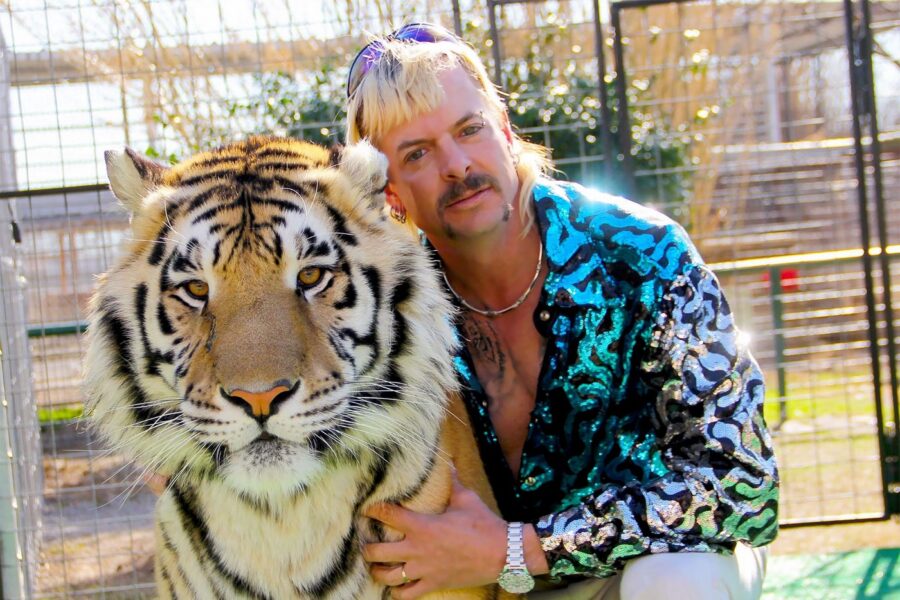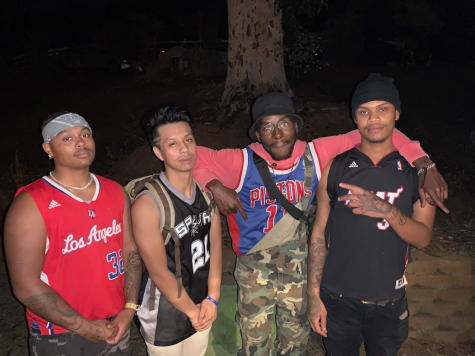Tiger King Tangents
Deep thoughts about Netflix’s new docuseries that make you go hmm…
With statewide stay-at-home orders in place, there has been plenty of time to do the things we have been putting off. Like to stop making excuses for reading that book or reorganizing the closet. To pick up a new hobby like scrapbooking or coin collecting. Or to take the time to reflect on deep thoughts and ask — what does it all mean? These days, it seems like all we have is time.
In an opportune moment, a childhood friend interrupted my regularly scheduled deep thought programming to ask a pressing existential question:
Friend: “Please tell me you’ve seen “Tiger King” on Netflix.”
Me: “No,” I replied with a curious naivety.
Friend: “Holy shit! I demand you watch it this weekend.”
Knowing that I wouldn’t be led astray — plus, I was looking for an excuse to be distracted — I went to Netflix for my daily dopamine rush. I binged watched the seven-episode tv mini-series and all I have to say — goodness gracious! These folks are crazy for cats!
“Tiger King: Murder, Mayhem and Madness” is a stranger than fiction story of the underbelly world of big cat zoos, the rivalries that exist, and its cast of eccentric characters that make this bizarre story, filled with many cringe-worthy moments.
Joe Exotic — whose real name is Joseph Maldonado Passage — was the owner of the Greater Wynnewood Exotic Animal Park, also known as the G.W. Zoo in Wynnewood, Oklahoma.
The best way to describe Exotic is larger than life, mullet-having, gun-loving gay polygamist who is highly-delusional, unapologetically narcissistic, and batshit crazy. That’s a mouthful.
He built a small empire of tigers, lions, and meth … oh my! Through a series of unbelievable events, Exotic allegedly orchestrated a murder-for-hire plot against his archnemesis Carole Baskin, the self-righteous owner of the Big Cat Rescue sanctuary. That crazy-ass small empire crumbled disastrously at his feet and landed him in jail.
After watching the entire series, I was left with more questions than answers and some firm opinions that left me disturbed, confused, and with a strong desire to shower immediately.
Disclaimer: This article doesn’t delve into all plotlines, however, there are many statements below that will spoil it for you if you haven’t watched the documentary yet. Proceed with caution.
- They barely have teeth but they got plenty of tigers.

The above picture is that of John Finlay — one of Joe Exotic’s many husbands — and Exotic’s right-hand man for many years. These are the type of people that are running these roadside zoos.
They live in squalor — specifically Joe Exotic and his employees — in these rodent-infested double-wide trailers that are one calamity away from crumbling into pieces.
There’s a stigma behind big cat owners, and “Tiger King” shows us the industry’s crème de la crème. These people have criminal backgrounds, substance abuse problems, and powertrip issues. They all think they’re above the law, and more importantly, these people get high off of being around exotic animals. Their idea of self-care includes booze, cigarettes, plenty of meth, and a gun strapped to their hip.
Thoughts that came to mind were:
People like this really do exist?
If these people can’t take care of themselves, how do they expect us to believe their animals are well-cared for?
How the hell are people like this even able to afford to buy exotic animals like this?
2. How is that we have more tigers in captivity than in the wild?
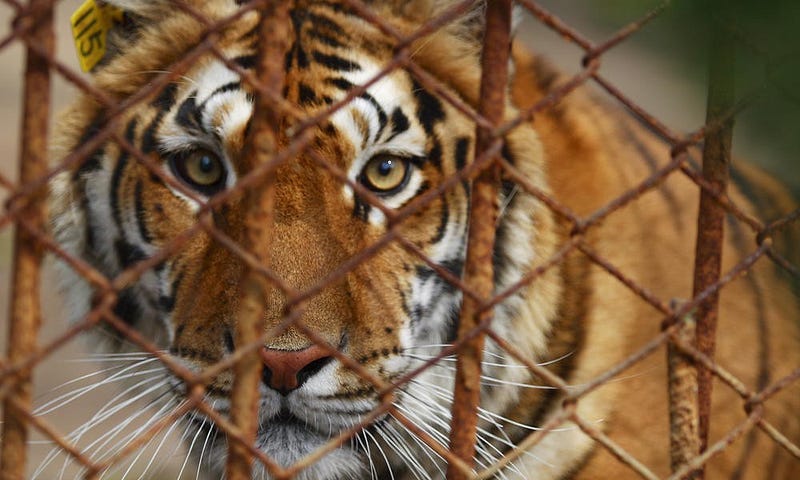
This is the most disturbing and disgusting reality of “Tiger King — in which the documentary negligently masked over. The series focuses more on the human drama — which is pretty darn compelling, I must admit — than it does on the real victims of the story. The animals held captive.
In the good old US of A, there are more tigers living in cages than there are living in the wild. It is estimated that 5,000 tigers are currently living in captivity and only 3,200 living in the wild. From zoos, theme parks, aquariums, and private ownership, there are millions of wild animals held in captivity.
Ultimately, it boils down to lax federal and state laws that fail to protect these animals. Sure, there is the Animal Welfare Act and the Endangered Species Act, which regulates the captivity and treatment of wild animals, however, according to activists, the protections are minimal. Some states ban keeping wild and exotic animals, and others allow private parties to keep animals with a permit.
These animals weren’t meant for a life of domestication and entertainment for the human masses. The documentary clearly shows these animals, specifically the tigers, being treated like disposable objects. Living a life of being poked and prodded at, inflicted by dangerous inbreeding practices, and being used as cub breeding machines.
I guess the lure of owning an exotic animal as a pet is to show a sense of individuality and uniqueness. Furthermore, to go and visit a big cat zoo makes people feel special. However, more people need to be ethically conscious about these issues because any way you look at it-it’s animal abuse.
Maybe through exposing how messed up and corrupt this all is, we will be able to get more laws passed that protect the best interest of endangered animals.
3. Who are the people that are paying up to $500 to see tigers?
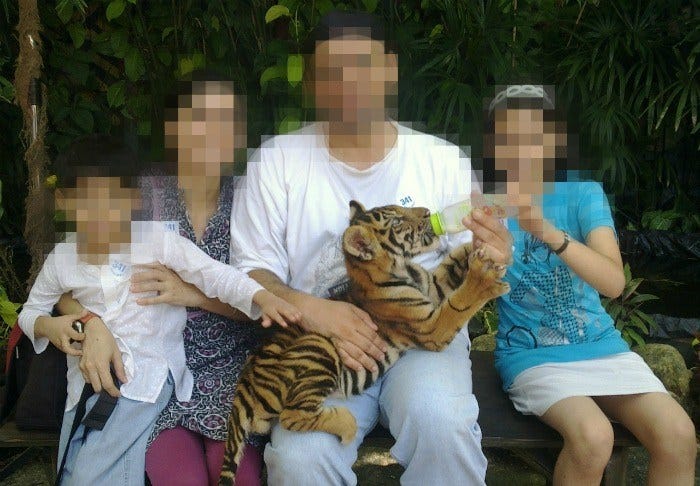
Most Americans are living paycheck to paycheck, especially the type of people that will save their schillings just to visit a big cat zoo. Tickets can run up to $500 a person for a guided tour, professional photos, and the related zoo merchandise. What attracts people to these zoos, and how the hell are they paying for something like this? I can’t even justify paying for a day pass to Disneyland, let alone a ticket to an over-priced zoo.
Really folks? What’s the fascination and lure with posing with exotic animals that are outside of its natural habitat and confined to inhumane conditions? Not only is it ethically questionable, but there is little to no return on that investment.
For the ones that own exotic animals, and the ones that pay to be a voyeur, it boils down to two things:
1) They want to appear unique and special. Its a form of status, like a luxury car or a trophy to show off and say, “Look at me.”
2) That Americana-like notion that it’s a God-given right to do one’s own thing, including owning a pet — no matter how exotic and dangerous that may be.
It’s a pop culture phenomenon that’s grossly misleading.
4. Carole Baskin: She (probably) did it.
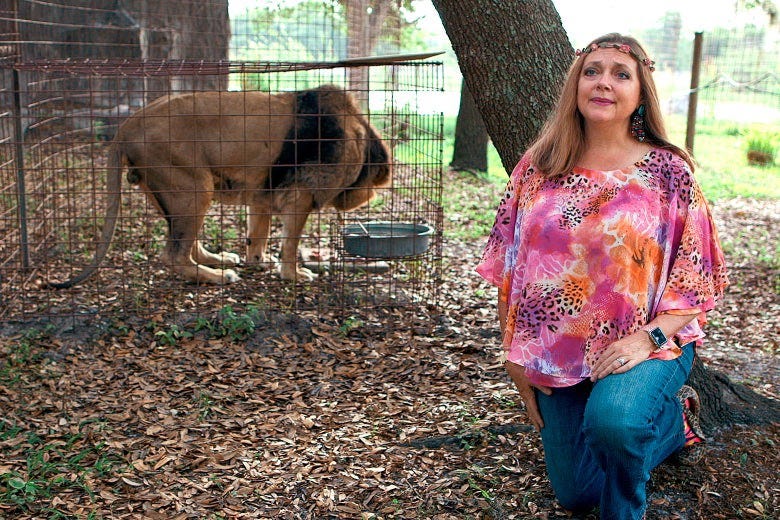
She’s an oddball, with a dreamy personality and a wanna-be bohemian spirit. She starts all of her online videos off with a greeting of “Hey all you cool cats and kittens!” — and you can’t help but feel uncomfortable and embarrassed for her. Worst of all, she’s a massive hypocrite. I will go into that a little bit later, but yeah, she’s a hypocrite and probably killed her husband.
There’s an entire episode of docuseries dedicated to the 1997 mystery and disappearance of Carole Baskin’s second husband, Don Lewis — a businessman — who was worth a lot of money. “Tiger King” implies that Baskin was involved with Lewis’ disappearance, and potentially fed her husband’s body to a pit of hungry tigers.
“Tiger King” has received a lot of flack for taking the spotlight off of the rest of the lunatics in the docuseries and villanizing Carole Baskin. No one is discrediting how appalling and disgusting Exotic, and the rest of the scuzzbucket cast is, but Baskin is no angel. She has received a bad wrap in the media because she comes off as cold and insincere. She’s the perfect antihero in this cast full of nutjobs.
Her callous demeanor and response to her missing husband is what baffled audiences the most. She giggles like a bashful and nervous schoolgirl, as she addresses rumors that she put Lewis’ body through a meat grinder and then fed him to tigers.
From her lack of alibi to the strange wording in Lewis’ revised will and testament — that said “upon my disappearance,” — suspicion points towards Baskin. The other shady events that happened in and around the disappearance of Don Lewis, that was depicted in the series, smells of foul play. Including mistreating Lewis’ first wife and their children mainly in terms of their share of the inheritance. Pretty stone-cold, I’ll admit.
So, I’m not saying she did it — but I am saying — she probably did it.
But, at this moment in time, the evidence against Baskin is circumstantial until she’s proven guilty.
Even O.J. Simpson suggested she had something to do with her husband’s disappearance, saying, “that lady’s husband is, uh, tiger sashimi right now.”
Welp, there you have it, folks. As the old adage goes, “it takes one to know one.”
5. Carole Baskin is a hypocrite.
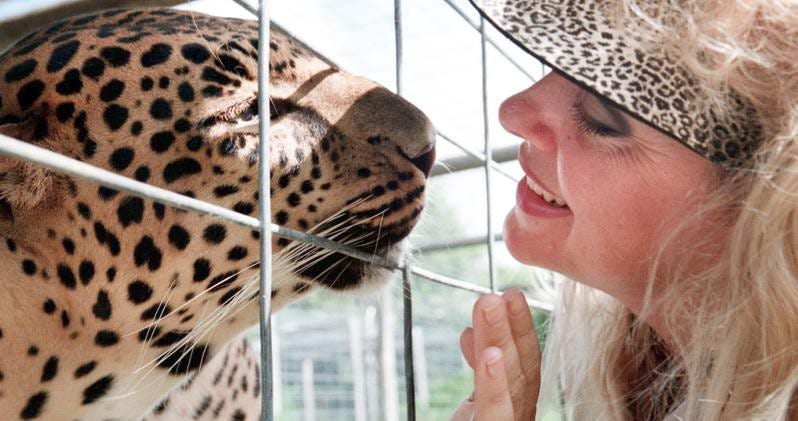
What’s the difference between an organization that cages animals to protect them against an industry that cages them to make money? Especially if both sides profit from the people who come to see the animals?
Big Cat Rescue is a 69-acre animal sanctuary located in Tampa, Florida. Their mission statement is to “end the abuse of big cats in captivity and prevent extinction of big cats in the wild.” However, they do not breed the animals, they just rescue them.
The lesser of the evils I suppose. But not, really.
There’s hypocrisy within the agenda of Big Cat Rescue and Carole Baskin is the captain behind that ship.
She’s a self-proclaimed cat enthusiast who gets a thrill from being around exotic animals. She cages animals, she makes money off of their captivity, yet she comes off as an elitist that thinks her “shit don’t stink.” It’s egregious.
Before Baskin started BCR, she, in fact, bred tigers and other wild animals. Now that she’s had a “change of heart,” her life’s mission is to shut down the surrounding big cat zoos, “rescue” those animals, put them on display in her own sanctuary, for her own profit.
BCR is a non-profit sanctuary that employs volunteers who work 10–12 hours a day, without pay. She admits that she doesn’t bother to learn their names until they’ve been around for a couple of years, however, they are the ones that keep her sanctuary operating.
The organization charges a fee for patrons to enter and take a tour on the grounds of the park. Also, they have a gift shop where customers can buy their merchandise for a moderate fee.
On top of the above — it’s a non-profit — where funding is sourced from government aid, tax breaks, fundraising, etc.
So the money is rolling in — no doubt — and Baskin is profiting off it.
It’s hard to find the philanthropic and moral value behind zoos like G.W. Zoo, or Big Cat Rescue, for that matter. It all boils down to virtually the same thing. An animal is caged to cash in on the public’s odd attraction to exotic animals.
6. Why was Joe Exotic the only one to take the fall?

“Tiger King” features a range of exotic cat entrepreneurs that all have suspicious motives. The usual suspects include Joe Exotic, his former business partner Jeff Lowe, zoo owner Doc Antle, and Carole Baskin, the “antithesis” of big cat zoos.
Exotic received a 22-year sentence for murder for hire against his arch-rival, Baskin; in addition, he was convicted of killing adult tigers and illegally selling tiger cubs.
However, the documentary clearly implies that the animal cruelty crimes that Exotic was accused of are standard practices amongst his competition. Exotic is not the only offender in this chaotic world of big cats, yet the FBI has made an example out of him.
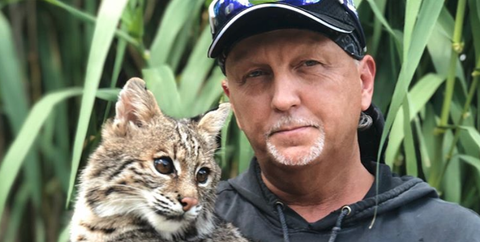
Jeff Lowe is obviously no saint, nor an animal activist. He’s actually a slimy felon that was previously convicted of smuggling tiger cubs and even accused of packing tiger cubs into suitcases to show them off at casinos and hotels for private parties in Las Vegas.
Not to mention, he participated in extensive conversations with Exotic regarding the plan to murder Carole Baskin. He obviously set Exotic up to take the fall so he could save his own ass and take full ownership of G.W. Zoo.
How did he not face any repercussions? Your guess is as good as mine.
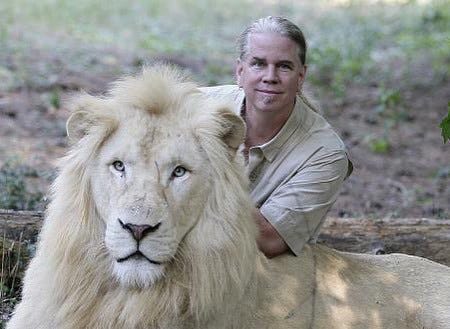
Bhagavan “Doc” Antle — the zoo owner of The Institute for Greatly Endangered and Rare Species (T.I.G.E.R.S.), is suspect too. Besides the fact that he appears to be the cult ringleader of a harem of scantily-clad women, who come to his preserve working long hours for minimal pay and who he allegedly pressures them to sleep with him in order to have moderate living conditions.
According to ex-employee Barbara Fisher, throughout her “apprenticeship,” she noticed some of the tigers would simply disappear. Still, she never witnessed how Antle disposed of the tigers, but the animals would just disappear suddenly. Exotic accused Antle of killing aging tigers in a gas chamber as a way of euthanization. However, this is an accusation that has not been proven as of yet.
Big questions to ask are: where does T.I.G.E.R.S. get their animals from? The zoo is known to breed cats on the preserve, so one would imagine it would be overrun with cats? Are tiger cubs being illegally sold?
What happens to the cats after the establishment can no longer use them? According to sources, something seems foul here, because there are only 60 cats currently living at Myrtle Beach Safari.
Antle is a shady shyster, plain and simple.
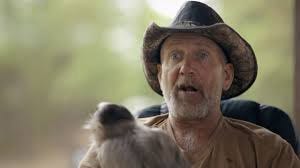
In the documentary, Tim Stark, the owner of Wildlife in Need, claims that breeding tigers in the United States is the only way to get the animals off of the endangered species list. I doubt that Stark nor anyone else in this industry gives away their cubs for free.
In essence, these crazy cast of characters are all suspicious, and it is safe to say Exotic isn’t the only one that should be in jail.
7. How did Joe Exotic pull all that ass?

Watching nearly all seven hours of “Tiger King” — I’m left with the burning question of — how did Joe Exotic pull all that ass?
The polygamist, who describes himself as “a gay, gun-toting cowboy with a mullet,” was able to lure in defenseless young men with troubled backgrounds and convince them to marry him. These young men are moderately good looking, even a toothless John Finlay — if he only was wearing a shirt and closed his mouth, of course. But to see them standing next to a much older Joe Exotic, as he awkwardly lusts all over them, is bizarre, to say the least. On top of that, two of his five husbands identified as straight and just played the gay part to live the exciting life of Joe Exotic’s husband. Or maybe they just wanted to have a roof over the head.
Was it the tigers that drew them in? Was it Exotic’s bleach-blonde mullet? Or was the meth that good?
8. America is obsessed.
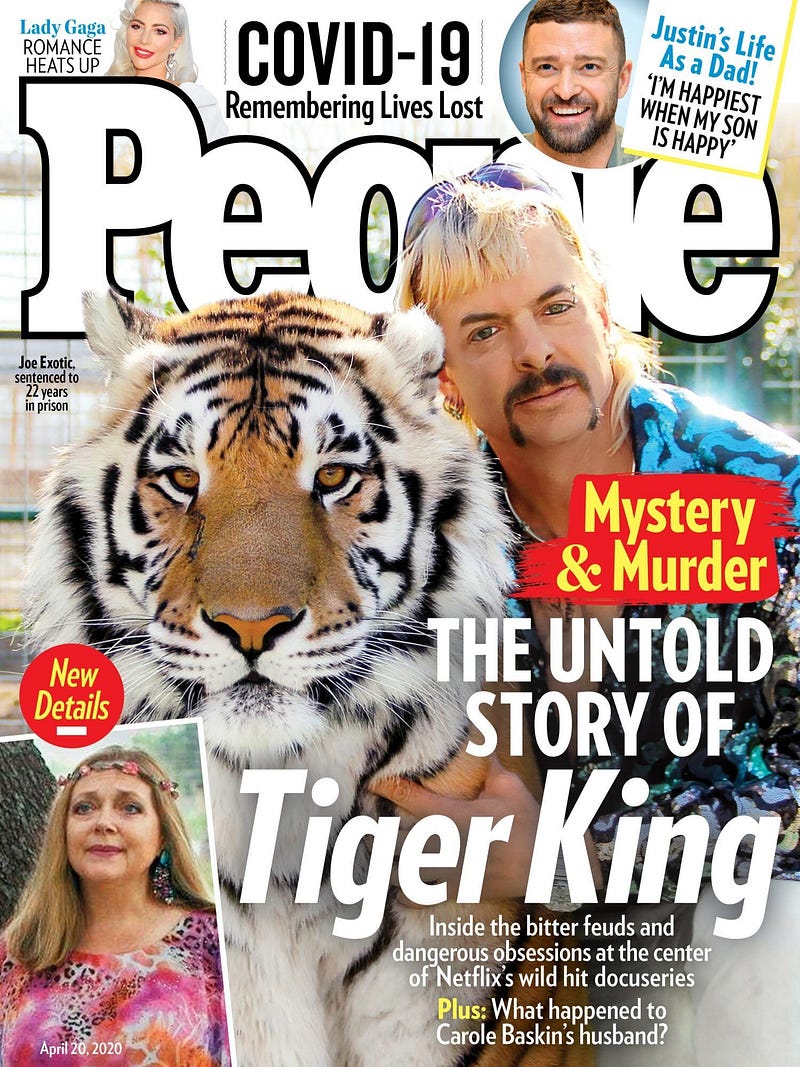
Many say “Tiger King” is the distraction that we need right now. The series hooks the audience in immediately with salacious exploits, that makes it all so watchable — and at the same time — makes it all so gross.
Frankly, America loves a good trainwreck, and that’s why the docuseries has taken off. We, the audience, can’t take our eyes off of these people who are made to look like small-town yokels that do and say the craziest things. They’re exploited for the sake of our own entertainment. The public reaction to the show is mind-boggling and worth examining.
From there comes the memes and parodies that make us all feel like we are in on the joke. This phenomenon causes the series to go viral, encourage more people to watch, and as a result, boost its popularity. The vicious cycle of pop culture at its finest.
America loves stupidity and our infatuation with celebrities. We have an obsession with making a celebrity out of the most infamous people. So it goes as no surprise that people are spending their time in quarantine dressing up in mullets and handlebar mustaches — as if they are preparing for Halloween. Or discussing if Brad Pitt or David Spade should play Joe Exotic in a movie adaptation.
We get wrapped up in the twists and turns of the series and overlook the fact of what these people actually do to each other or the animals they keep.
“Tiger King” isn’t about big cats and the alarming reality of our society’s fascination with exotic animals. The series doesn’t teach us anything, it just makes us feel better, a little more normal throughout these abnormal times because we can compare our lives to those less fortunate.
If you haven’t watched “Tiger King” but made it this far into the article, you should probably just count your losses and not watch it.
And if you have seen it — it’s worth giving a deep thought or two towards. Like, why does it makes us feel uneasy and why we can’t just look away?

